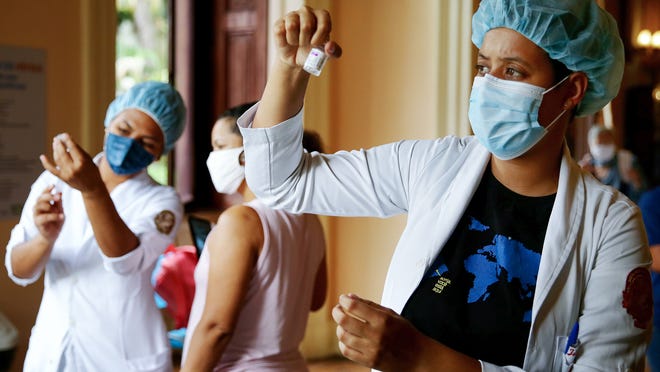As Americans get vaccinated against the coronavirus, a report published Wednesday found teens and adults may have missed millions of routine vaccinations recommended by the Centers for Disease Control and Prevention in 2020.
The study, commissioned by GlaxoSmithKline (GSK) and conducted by Avalere Health, analyzed vaccine claims from January through November 2020 and compared them with the same timeframe in 2019.
Researchers found teens and adults may have missed more than 26 million doses of recommended vaccines in 2020, which includes 8.8 million missed adolescent vaccines and 17.2 million missed adult vaccine doses.
“Millions of people have been immunized to protect against COVID, but many are missing protection against other diseases,” said Dr. Leonard Friedland, vice president and director of scientific affairs and public health at GSK Vaccines. “As life returns to normal, we must prioritize getting individuals caught up on their missed vaccines.”
Vaccine claims were up to 35% lower for teens in 2020 compared with 2019, and claims for adults were up to 40% lower.
Despite public health warnings of a possible “twindemic,” a scenario in which hospitals could be overrun by both coronavirus and influenza infections, overall flu vaccination rates decreased in 2020.
According to the study, flu vaccination claims from August to September 2020 exceeded the same months in 2019. The surges leveled off by October, leaving total claims from September to November 2020 up to 35% lower compared with 2019.
The study analyzed only vaccine claims across commercial, managed Medicaid, Medicare Advantage and Medicare fee-for-service part B markets, so vaccinations at pharmacies and other types of insurance claims were not included. Neha Vyas said the data results track closely with her experience at the Cleveland Clinic as a family medicine physician.
“We did make a push saying this coronavirus was a respiratory virus, and then those who were afraid of the (flu) vaccine running out got the vaccine early, but then it sort of teetered out,” she said. “As the pandemic took effect and the second and third wave hit us, there were people who were not willing to venture out for routine preventative care.”
The GSK study is one of the first reports to track missed adult vaccinations last year. A study in November 2020 by the Blue Cross Blue Shield Association estimated 9 million childhood vaccination doses may have been missed by the end of 2020 because of the pandemic.
Sin Nombre hantavirus:Officials confirm Michigan’s first human case of a deadly hantavirus. What to know about the Sin Nombre virus.
‘A choice between food and living’:Prescription drug prices increased twice the inflation rate of US economy in 2020, AARP report finds
Vyas said adolescent and adult vaccinations don’t get as much visibility as childhood vaccinations, but they’re just as important to keep up.
“The reality is that vaccines don’t stop with just the pediatric populations,” she said. “It’s important to remember that vaccines are necessary in the adolescents, young adult and older adult populations.”
The CDC recommends adults get vaccinated against pneumonia, shingles and hepatitis A, while teens should be vaccinated against certain types of meningitis and the human papillomavirus (HPV). Diphtheria, tetanus and pertussis (Tdap), as well as an annual flu shot, are recommended by the agency for teens and adults.
Other vaccines analyzed by the study researchers included shots for haemophilus influenzae (Hib), hepatitis B, chickenpox and measles, mumps and rubella (MMR).
It’s not too late to get these vaccinations, Vyas said. The CDC updated guidance May 14, dropping an earlier recommendation that people wait at least 14 days between receiving the COVID-19 vaccine and any other vaccine.
This means patients can ask their doctors about receiving missed vaccines while getting their COVID-19 shot, Vyas said.
“It’s time, it’s time for your preventive maintenance. Don’t keep putting it off,” she said. “We’re here, and we’re ready to resume care.”
Follow Adrianna Rodriguez on Twitter: @AdriannaUSAT.
Health and patient safety coverage at USA TODAY is made possible in part by a grant from the Masimo Foundation for Ethics, Innovation and Competition in Healthcare. The Masimo Foundation does not provide editorial input.
